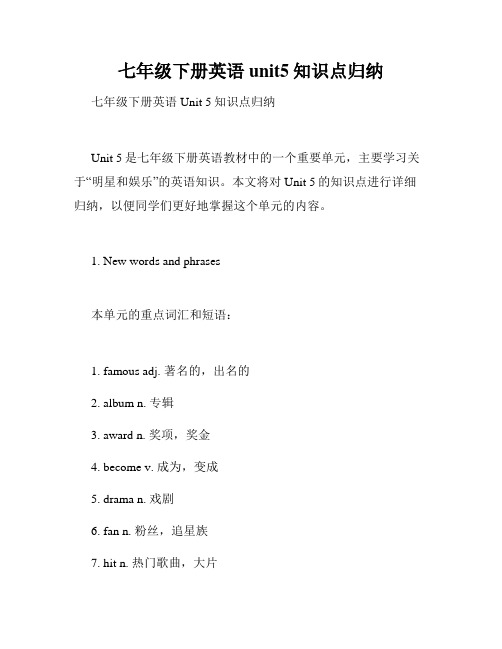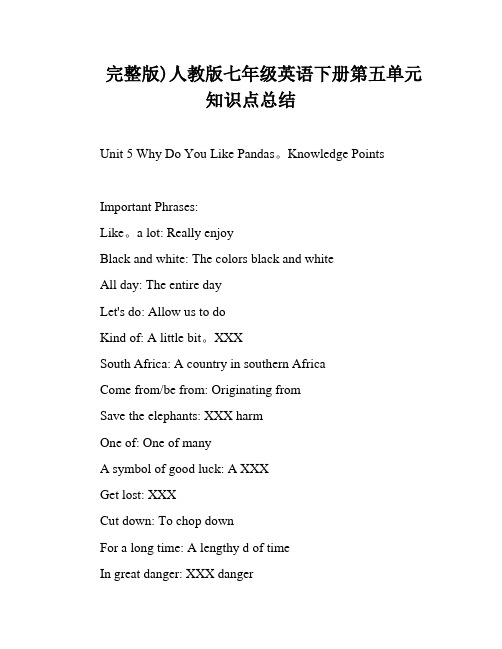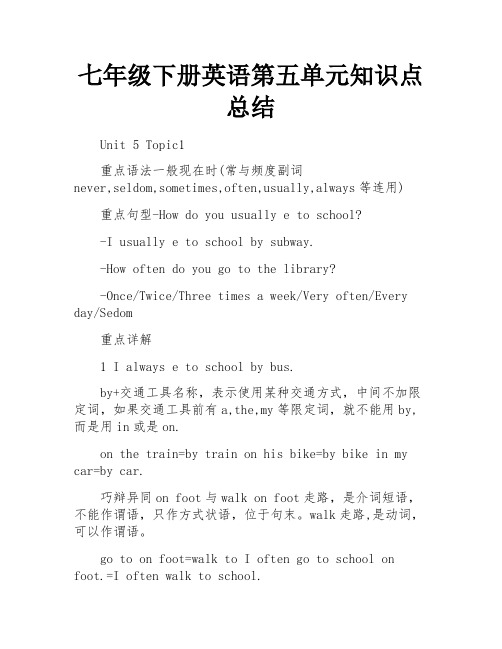七年级下册U5知识点总结
七年级下册英语unit5知识点归纳

七年级下册英语unit5知识点归纳七年级下册英语Unit 5知识点归纳Unit 5是七年级下册英语教材中的一个重要单元,主要学习关于“明星和娱乐”的英语知识。
本文将对Unit 5的知识点进行详细归纳,以便同学们更好地掌握这个单元的内容。
1. New words and phrases本单元的重点词汇和短语:1. famous adj. 著名的,出名的2. album n. 专辑3. award n. 奖项,奖金4. become v. 成为,变成5. drama n. 戏剧6. fan n. 粉丝,追星族7. hit n. 热门歌曲,大片8. magazine n. 杂志9. movie n. 电影10. performance n. 演出,表演11. popular adj. 受欢迎的,流行的12. singer n. 歌手13. talent n. 天赋,天才14. TV show n. 电视节目2. Grammar本单元的语法重点:1. Be动词的用法:am/is/are例如:I am a fan of Justin Bieber.He is a famous singer.We are going to watch a movie tonight.2. 一般现在时的第三人称单数形式:一般情况下,一般现在时的动词加s,但是词尾是s、x、sh、ch结尾的动词要加-es。
例如:She loves to watch TV shows.My brother listens to pop music.Tom watches a lot of drama on TV.3. 物主代词的用法:我的 + 名词:my 名词你的 + 名词:your 名词他的 + 名词:his 名词她的 + 名词:her 名词我们的 + 名词:our 名词你们的 + 名词:your 名词他们的 + 名词:their 名词例如:This is my album.That is her TV show.Their performance was amazing.3. Sentence patterns本单元的句型重点:1. I am a fan of...例如:I am a fan of Justin Bieber.I am a fan of superhero movies.2. He/She is a famous...例如:She is a famous singer.He is a famous actor.3. He/She became famous because...例如:He became famous because he won an award.She became famous because she starred in a hit movie.4. Do you like...?例如:Do you like pop songs?Do you like to watch TV shows?4. Listening and speaking本单元的听说重点:1. 用英语发表关于自己最喜欢的歌手、电影或电视节目的简短演讲。
七年级英语下册Unit5单元知识点

七年级英语下册Unit5单元知识点Unit 5是七年级英语下册中的一个重要单元,这个单元中包含了大量的知识点。
以下是对Unit5单元知识点的详细介绍。
一、语法知识点1. 语态:被动语态的构成及用法被动语态的构成:be动词 + 过去分词被动语态的用法:强调动作的动作的受动方,而非主动方。
例如:The book was written by him.(这本书是他写的)2. 疑问句及其回答疑问句的构成:be动词/助动词/情态动词+主语+动词原形+其他?Yes/No + 主语 + be动词/助动词/情态动词。
例如:- Are you a student?- Yes, I am.- Do you like hamburgers?- No, I don’t.3. 特殊疑问句及其回答特殊疑问句的构成:疑问词(who/what/where/when/why/how)+ be动词/助动词/情态动词+主语+动词原形+其他?疑问词 + 主语 + be动词/助动词/情态动词。
例如:- What is your favorite color?- My favorite color is blue.- Where do you live?- I live in New York.二、词汇知识点1. 动词短语动词短语是指由动词和其它成分组成的短语,常用于描述动作、状态或动作的完成情况等。
例如:look after(照顾)、enjoy doing(喜欢做某事)、get up (起床)2. 形容词形容词是指用来修饰名词或代词的词语,可以描述名词或代词的性质、特点等。
例如:happy(快乐的)、hungry(饥饿的)、dirty(脏的)3. 名词名词是指用来表示人、事、物、地点等的词语,常用于构成句子的主语、宾语等成分。
例如:book(书)、teacher(老师)、classroom(教室)三、阅读理解阅读理解是指通过阅读一段文章,理解其中的意思并回答问题的能力。
完整版)人教版七年级英语下册第五单元知识点总结

完整版)人教版七年级英语下册第五单元知识点总结Unit 5 Why Do You Like Pandas。
Knowledge PointsImportant Phrases:Like。
a lot: Really enjoyBlack and white: The colors black and whiteAll day: The entire dayLet's do: Allow us to doKind of: A little bit。
XXXSouth Africa: A country in southern AfricaCome from/be from: Originating fromSave the elephants: XXX harmOne of: One of manyA symbol of good luck: A XXXGet lost: XXXCut down: To chop downFor a long time: A lengthy d of timeIn great danger: XXX dangerXXX ivory: XXXPlaces with food and water: XXX sustenanceKill。
for: To take the life of an animal for a specific purpose1.Seeing Pandas: Observing pandas2.My Favorite Animals: XXX XXX3.e to SP: Greetings to SP4.e Back to SP: Greetings to SP upon returning5.From: Originating from6.In the Zoo: Located in a zoo7.On the Farm: Located on a farm8.My New Pet: XXX9.XXX: Bipedal movement10.Kind of: XXX11.Kind of Interesting: XXX12.A XXX: XXX13.A Little Boring: XXX14.A Kind of: A type of15.All Kinds of: Many different types of16.All Day: The entire day17.A Good Name for XXX: A fitting name for a person18.South Africa: A country in southern Africa19.South China: The southern n of China20.South America: The southern n of the Americas21.America。
七年级英语下册Unit5知识点汇总

七年级英语下册Unit5知识点汇总Unit5ourSchoolLifeTopic1一、重点词语:aeup醒来,唤醒getup起床gotoschool去上学gohoe回家godancing/shopping/sating/siing去跳舞;购物、滑冰;游泳godoingsoething可用于表达去进行某种娱乐休闲活动。
表示交通方式:onfoot步行byboat坐船byship坐船byair乘飞机byplane乘飞机bytrain坐火车bysubay搭乘地铁bycar坐小汽车bybus坐公共汽车bybie骑自行车taethesubay/bus/car搭乘地铁;公共汽车;小汽车driveacartoor=gotoorbycar驾车去上班taeabustoor=gotoorbybus乘公共汽车去上班gotoschoolonfoot=altoschool步行去上学rideabie/horse骑自行车;骑马afterschool/class放学以后;下课以后playthepiano/guitar/violin弹钢琴;吉他;小提琴playbasetball/soccer/football打篮球;踢足球;打橄榄球playputergaes玩电脑游戏playithaputer玩电脑playsports做运动0.nextto紧挨着,在…旁边1.aplanofyschool一幅我们学校的平面图oneedays在工作日ateeends在周末3.havebreafast/lunch/supper/dinner/eals吃早餐;中餐;晚餐;正餐;一日三餐haveclasses/lessons/aeeting上课;上课;开会atchTV/ovies/gaes/theanials看电视;电影;比赛;动物readnovels/nespapers/boos看小说;报纸;书ashone’sface/clothes洗脸;衣服反义词:up–don,early–late近义词:quicly–fast getupearly早起belatefor迟到thefirst/second/third/fourthday;二;三;四天cleanthehouse打扫房子表示建筑物:ontheplayground在操场atschool/hoe/table在学校;家里;桌旁inaputerroo/teachers’office/classroobuilding/gy/library/lab/canteen 在电脑室;教师办公室;教学楼;体操馆;图书馆;实验室;食堂0.aroundsixo’cloc=ataboutsixo’cloc大约在六点1.频率副词:never,seldo,soeties,often,usually,alays二、重点句型:It’stietogetup.该起床的时候了。
七年级下册英语知识点U5

七年级下册英语知识点U5Unit 5是七年级下册英语学习中的一个重要部分,主要涵盖了一些关于“动词”的知识点。
本篇文章将要介绍U5中的主要知识点,从而帮助读者更好的掌握英语。
一、动词的分类动词分为及物动词和不及物动词两种。
及物动词后面需跟宾语,不及物动词则不需要,例如:及物动词:I like bananas.(我喜欢香蕉。
)不及物动词:The baby is sleeping.(宝宝在睡觉。
)二、动词的时态1. 现在时现在时分为一般现在时、现在进行时和现在完成时。
一般现在时主要用于描述现在的情况或事实,现在进行时则表示现在正在进行的动作,现在完成时则表示过去某个时间内发生的动作对现在的影响。
例如:一般现在时:She often listens to music.(她经常听音乐。
)现在进行时:She is singing.(她正在唱歌。
)现在完成时:I have finished my homework.(我已经完成了我的作业。
)2. 过去时过去时分为一般过去时、过去进行时和过去完成时。
一般过去时主要用于描述过去的情况或事实,过去进行时则表示过去正在进行的动作,过去完成时则表示过去某个时间内完成的动作对现在的影响。
例如:一般过去时:They studied English yesterday.(他们昨天学了英语。
)过去进行时:She was watching TV all night.(她一整晚都在看电视。
)过去完成时:I had read the book before class.(我在上课前已经读过这本书了。
)三、动词的原形、过去式和过去分词动词分为原形、过去式和过去分词。
原形通常是指动词的基本形式,过去式则是动词在过去时的形式,过去分词则是动词完成时所需的形式。
例如:原形:go过去式:went过去分词:gone四、其他相关知识点1. 动词的形式变化规则:除了少数非规则动词外,大部分动词在过去式和过去分词时都需加上-ed。
七年级英语下unit5知识点

七年级英语下unit5知识点本文主要介绍七年级英语下Unit5的知识点,包括词汇、语法、口语和听力技巧,以便同学们更好地学习和掌握这个单元的内容。
一、词汇1.表达时间的单词和短语常用的表达时间的单词和短语有:(1)钟表时间:o'clock、half past、quarter to、quarter past。
(2)日历时间:today、tomorrow、yesterday、the day before yesterday、the day after tomorrow、next week、last month等。
2.单词拼写打字速度越来越快,但是正确的拼写仍然非常重要。
在这个单元,同学们需要掌握一些常用的单词拼写,如:January、February、March、April等月份的拼写,以及问候用语“Hello”、“Hi”、“Good morning”、“Good afternoon”、“Good evening”等。
3.表达数量的单词和短语在本单元,同学们需要学习一些表达数量的单词和短语,包括:a pair of、a couple of、a dozen、a hundred、a thousand、two-thirds、half等。
二、语法1.时态时态是英语语法中最基本的部分之一。
在本单元,同学们需要掌握的时态有:(1)一般现在时:表示习惯、事实或常态。
(2)一般过去时:表示过去发生的事情。
(3)将来时:表示将来要发生的事情。
2.句型同学们在本单元也需要掌握一些基础的英语句型,如:(1)What's the time? It's ...(2)When is your birthday? It's on ...(3)What do you usually do on weekends?(4)I like to ..., I don't like to ...(5)He/She/They usually ..., but today he/she/they ...三、口语1.日常问候用语日常问候用语是英语学习的基础,同学们需要学会用英语自然地对话,例如:(1)Hello. How are you?(2)Hi. What's up?(3)Good morning/afternoon/evening.2.表达时间的口语在表达时间时,语气清晰、准确是非常重要的。
七年级下册英语第五单元知识点总结

七年级下册英语第五单元知识点总结Unit 5 Topic1重点语法一般现在时(常与频度副词never,seldom,sometimes,often,usually,always等连用)重点句型-How do you usually e to school?-I usually e to school by subway.-How often do you go to the library?-Once/Twice/Three times a week/Very often/Every day/Sedom重点详解1 I always e to school by bus.by+交通工具名称,表示使用某种交通方式,中间不加限定词,如果交通工具前有a,the,my等限定词,就不能用by,而是用in或是on.on the train=by train on his bike=by bike in my car=by car.巧辩异同on foot与walk on foot走路,是介词短语,不能作谓语,只作方式状语,位于句末。
walk走路,是动词,可以作谓语。
go to on foot=walk to I often go to school on foot.=I often walk to school.同样,go to.by bike=ride a bike to go to.bycar=drive a car togo to by plane=fly to go to by bus=take a bus to2 Come on!It s time for classe on快点,加油,来吧。
It s time for sth.该做某事了,与It s time to do sth.意思一样。
3 look的短语look the same看起来一样look like看起来像look for寻找look after照顾4 do my homework at school在学校做作业do one s homework做家庭作业(注意:one s要随主语的变化而变化,常用形容词性物主代词my,your,their,our,his,her等)。
七年级下册unit5知识点总结

七年级下册unit5知识点总结七年级下册Unit 5知识点总结七年级下册的Unit 5主要讲了“Would you like to travel?”这一话题,涵盖了许多与旅行相关的知识。
本文将对该单元的知识点进行总结。
一、词汇1. travel:旅行2. destination:目的地3. accommodation:住宿4. transportation:交通工具5. itinerary:旅行计划6. souvenir:纪念品7. guidebook:旅游指南8. language:语言二、句型1. Would you like to travel to...?“Would you like to...?”是询问对方是否想要做某事的常用句型,用来询问对方是否对某个旅行目的地感兴趣。
例如:Would you like to travel to Japan?2. Yes, I’d love to.“Yes, I’d love to.” 是肯定对方提议的常用回答,表示愿意去。
例如:A: Would you like to go to the beach this weekend?B: Yes, I’d love to.3. How long are you staying?“How long are you staying?”用来询问对方在某个地方待多久。
例如:A: How long are you staying in Shanghai?B: I’m staying for three days.4. What’s your itinerary?“What’s your itinerary?”用来询问对方的旅行计划。
例如:A: What’s your itinerary for your trip to Paris?B: I’m going to visit the Eiffel Tower and the Louvre Museum.5. What’s the best way to get to...?“What’s the best way to get to...?”用来询问前往某个地方的最佳交通方式。
- 1、下载文档前请自行甄别文档内容的完整性,平台不提供额外的编辑、内容补充、找答案等附加服务。
- 2、"仅部分预览"的文档,不可在线预览部分如存在完整性等问题,可反馈申请退款(可完整预览的文档不适用该条件!)。
- 3、如文档侵犯您的权益,请联系客服反馈,我们会尽快为您处理(人工客服工作时间:9:00-18:30)。
七年级下册知识点总结Unit 5 Topic1 重点短语1. on foot go …on foot = walk ( to )…2. at the school gate在学校大门口3. on weekdays 在平日 ,在工作日4. on weekends=on the weekend在周末5. after school 放学后6. after class 下课后7. after breakfast / lunch / supper 早餐 / 午餐 / 晚餐后8. in ones free time在某人空闲时间9. have a rest 休息一下10. read books 读书11. go swimming 去游泳12. listen to music听音乐13. watch TV 看电规14. do one’s homework 做作业15. go to the zoo / park 去动物园 / 公园16. once/twice a week 一周一次 /两次17. every day 每天18. have classes 上课19. for a short time 一会儿20. go to bed 上床睡觉21. come on 快点,加油,来吧22. get up 起床23. talk with / to sb.与某人谈话24. at school 在学校、在上课25. go to school 去上学26. and so on ……等等重点句型 1. Happy New Year! The same to you.2. Your new bike looks very nice. Thank you.3. How do you usually come to school? —I usually come to school by subway.4. How often do you go to the library?. —Once/Twice/Three times a week/Very often/Every day/Seldom5. The early bird catches the worm. (谚语) 笨鸟先飞7. Work / Study must come first. 工作/ 学习必须放在第一位8. Classes begin at eight. =Class begins at eight.9. What time does the class begin? / What time do the classes begin?10. We have no more time. 我们没有更多的时间了。
11. I have four classes in the morning and two in the afternoon.我早上上四节课下午上两节。
12. She goes to bed at about a quarter to ten. 她九点四十五分睡觉。
重点详解 1.乘坐交通工具by +交通工具by car/bus/train/shiptake the+交通工具take the bus/caron+大型封闭式工具on the bus/ train/ship/planeon the train=by train on his bike=by bike=on a bikein +小型封闭交通工具in a car/taxi/in my car=by cargo to…on foot= walk to…go to….by bike = ride a bike…go to…. by car = drive a car to…go to … by plane = fly to…go to… by bus = take a bus to…go to …by subway=take the subwayto .2.It’s time for sth. “该做某事了”=It’s time to do sth.3. It’s time for class. =It’s time to have class. =It’s time for havingclass.4.look +adj (look感官动词,系动词) 看起来 His mother looks very young.Her dress looks very nice. You look very cool in this coat.look的短语:look the same看起来一样 look like看起来像……look for寻找 look after =take care of 照顾照料look around/about 四处看看四下环顾。
look back 回头看;回顾。
4. do one’s homework 做家庭作业注one’s 要随主语变化常用形容词性物主代词my, your, their, our, his, her 等。
do my,/ your/ their/ our/ his/ her homework5.at school 在学校6. want to do sth=would like to do. “想做某事”know about…“了解/知道关于…”。
we want to know about the school life of American students.我们想了览一下美国学生的学校生活。
6. a few+可数名词几个/一些few+可数名词很少/几乎没有7.a little+不可数名词一点/一些little +不可数名词很少/几乎没有e.g.He has a few friends. 他有几个朋友。
He has few friends. 他几乎没有朋友。
e.g. I can speak only a little Chinese. They has little money. 他们没有什麽钱e.g. Can you speak English? ---Yes, but only a little.8. go fishing 去钓鱼 go shopping 去买东西go boating 去划船 go swimming 去游泳. 9. (1). How often 多久一次对频度进行提问答语常用频度副词always/ usually/often/ sometimes/seldom/never / once a week一周一次 /twice a month每月两次/three times a year每年三次How often do you go to the library? 你多丽去一次图书馆--once/twice/three times/four times a week/month/year10. be over 结束 School / Class is over. What time is the class over?11. begin 开始现在分词: beginning What time does the class begin?12.打……球 play soccer/basketball一般现在时表示常与频度副词never, seldom, sometimes, often,usually, always 等连用1现在所处的状态。
Jane is at school.2经常、习惯性的动作。
I often go to school by bus.3主语具备的性格或能力。
He likes playing football.Unit 5 Topic2 重点短语1. make cards 制作卡片2. on the playground 在操场上3. in the library 在图书馆4. in the gym在体育馆5.in the swimming pool 在游泳池6.in the classroom 在教室7.in the dinning hall在食堂8. on the shelf 在书架上shelves 复数9. at the Lost and Found 在失物招领处10.clean the room/blackboard打扫房间11.have a soccer game 进行足球比赛12. have an English class 上英语课13. write a letter 写信14. some of his photos = some photos of his 他的一些照片15. on time 准时16 show sb. around…带领某人参观……17 be kind to sb =be friendly to sb 对某人很友好重点句型 1. What are you doing? 你在做什么? ---- He is cleaning the blackboard.2. Are you doing your homework? Yes, I am./No, I am not.3. May I borrow your…..? 我可以借你的。
吗?Of course/Sure/No problem. 当然可以。
4.How long can I keep them? 我能借它们多长时间?Two weeks. 两周5. Sorry, I don’t have any. 对不起,我没有。
Thank you all the same. 仍然感谢你。
重点详解1. some, a few a little “一些有些”三者都修饰名词。
some既可以修饰可数名词又可以修饰不可数名词。
We want some apples and some water.a few用在可数名词复数a little用在不可数名词。
There are a few books and a little waterin the classroom.2. 与how相关的短语how often多常 how many多少 how much多少钱 how old多大3.And you must return them on time.你必须按时归还它们。
return意为“归还、回来”① return sth. to sb.把某物归还给某人=give back sth. to sb.② return to“回到…”相当于come back to…4. talk“交谈”常用的短语talk to/with sb.“与某人交谈”(1) talk“交谈”表示通过谈话方式交换意见、消息等。
